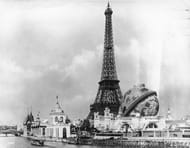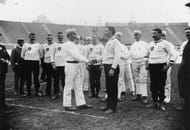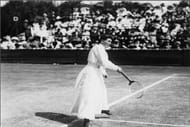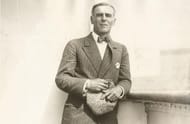Following the success of the first edition of the modern Olympics in Athens, the second Olympics were held in Paris. Almost 1000 athletes from 28 nations took part.
These Olympics were bigger, better and more diverse. These Olympics also gave way to equality, as women made their official debuts.
The Olympics were held in Paris as a part of the 1900 World's Fair. Since many did not know that they were participating at the Olympics, they participated just for fun.
These Olympics were one of the few editions that lasted for months. The Olympics began in May, and went on till the month of October.
This was also the last edition where the winners received silver medals and the runners up a slightly upgraded version of a bronze medal.
Paris 1900 was also the edition where several sports made their debut, and several sports were played for the first and only time. This is the only edition where live pigeons were used for the shooting event. One might thank the International Olympic Committee for being humane enough since then.
This was also the edition where India made their debut, though as a nation our debut would come much later. Anglo-Indian athlete Norman Pritchard won two silver medals for his heroics in athletics. Unfortunately, he is the only Indian to have ever tasted Olympic success in athletics.
The Paris Olympics is also the edition where several sports were played for the first and the last time, such as automobile racing, cricket, croquet to name a few.
You won't believe this, but the organizers even attempted underwater swimming in this edition.
If only some of the modern organizers took a leaf or two from their predecessors.
Let us have a look at some of the unforgettable moments from the Paris Olympics of 1900.
#1 Far more diverse Olympics

In comparison to the Athens Olympics, the Paris Olympics were a far more successful and diverse affair. 997 athletes, which included 25 women from 28 different nations, participated in these Summer Olympics. The Olympics began on May 14 and ended on October 28.
While Athens Olympics were undoubtedly the first edition of the modern Olympic Games, Paris Olympics were the first Olympics to be conducted under the presidency of Pierre de Coubertin. By now, he was the president of the International Olympic Committee.
Undoubtedly, the Paris Olympics had its own unique history. However, this was perhaps also the last edition where there were no prizes for the 3rd place winners. Most of the winners were given cups or trophies. Some winners got silver medals, while others got bronze medals for coming second.
If Athens Olympics gave birth to the modern Summer Olympics, the Paris Olympics gave birth to diversity overall. There were many historic firsts and 20 nations had the luck of standing on the victor's podium as well.
Apart from London and Athens, Paris is the only lucky city which has had the honor of hosting the Olympics more than once. Tokyo will join the list soon.
#2 Several historic firsts

The Paris Olympics is also a witness to several historic firsts. For the first time, many sports made a debut at this event. For the first time, women were allowed to participate.
For the first time, polo was allowed at any multi-event sports. Before the Berlin Olympics of 1936, polo was a principal team sport for the Summer Olympics.
Fun fact: A sport as unconventional as the tug of war had also made their debut in this edition. Yes, for almost two decades, tug of war was an Olympic sport.
Until the Antwerp edition of 1920, tug of war was an important sport at the Summer Olympics. In the first edition at Paris, a mixed team of Denmark and Sweden won the championship, defeating the hosts France in the finals.
Actual teams participated in this sport, and Great Britain was the most successful team in this discipline. They won two gold medals, two silver medals and a bronze medal overall in this discipline, including the last gold medal at the Antwerp Games in 1920.
#3 First and only appearance of cricket and croquet
![Paris 1900 - When cricket made its only appearance [Image for Representational Purposes Only]](https://staticg.sportskeeda.com/editor/2021/06/607a2-16246334788752-800.jpg?w=190)
The Paris Olympics was also the first and the last occasion when some sports made their appearance. Cricket, Croquet, Basque Pelota, Automobile Racing, Underwater Swimming etc. made their first and only appearances at this edition.
Originally, cricket teams representing Belgium, France, Netherlands and Great Britain were scheduled to compete against each other. However, in the end, it was only Great Britain and France who took part in the Games. This match would have remained unknown but for John Symes, a diligent member of the victorious English team, who kept a scorebook with himself.
Great Britain's Devon and Somer Wanderers team, being the clear professionals they were, defeated a rag tag team from France by a handsome margin of 158 runs. Since this match had 12 players-a-side, it was therefore not accorded a first class status. Even today, some cricketers don't consider this as an official cricket match.
Funnily enough, this was also the only Olympics where croquet and basque pelota were organized. This was also the first and the last Olympics where live pigeons were used for the trap shooting event. That probably created a lot of mess, which is why clay disks have been substituted for the same.
However, one could not understand as to why the organizers removed automobile racing and motorcycle racing. These sports also made their only appearance at the Paris Olympics. Imagine if they were held now.
#4 Charlotte Cooper - The icon of equality in sports

In modern times, the lines between equality and practicality have blurred, or we can say gone for the worse. However, there was a time when change happened for the good, even if it happened slowly.
It was an era when the European world was slowly awakening to the ideals of gender equality. The Paris Olympics was the biggest experimental stage for the same. One woman emerged as the biggest champion of the same. Her name was Charlotte Cooper, and even today, she is considered an icon for women's sports.
Charlotte Cooper was one of the first women tennis players from England. Like many other female players, she made her debut in Paris as well. In Paris, where women participated for the first time, Charlotte won the tennis singles event.
Charlotte became the first woman to win an individual Olympic title. On 11 July 1900, she defeated Hélène Prévost in the final in straight sets and became the first female Olympic tennis champion. However, she just didn't stop there. With Reginald Doherty, Charlotte won the mixed doubles title after a straight-sets victory in the final against Hélène Prévost and Harold Mahony.
#5 Norman Pritchard - India's first and only Olympic medalist in athletics

Not many know that the Paris Olympics was also the place where India officially made their Olympic debut. Ironically, it was in the discipline where an independent Indian is yet to win an Olympic medal of any kind till date. Thanks to his medals, India achieved their best ever position in any medal tally - 17th out of 20 nations.
In 1900, an Anglo Indian soldier, Norman Trevor Pritchard, was in Paris. He was born and brought up in Calcutta. He was well trained in athletics, and he volunteered to run in 200 meters and 200 meters hurdles. He came 2nd in both, and his medals are now credited as India's first medals at the Summer Olympics to date. Sadly, he didn't earn much fame from it and died a penniless man.
However, it took another 28 years for India to win another medal, though in field hockey. Individually, as an independent nation, it took 52 years to bring home an Olympic medal through wrestler KD Jadhav from Helsinki Olympics.
It took an Army soldier named Major Rajyavardhan Rathore 104 years to bring home India's first individual Olympic silver medal. But for Norman Pritchard, India's first medal came at the Paris Olympics in 1900.
